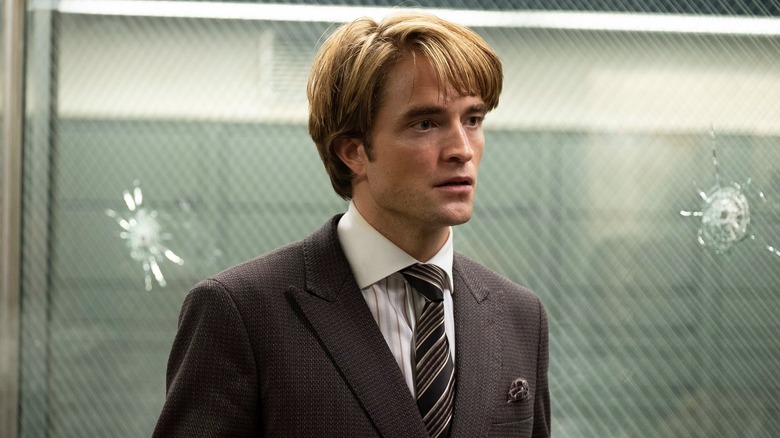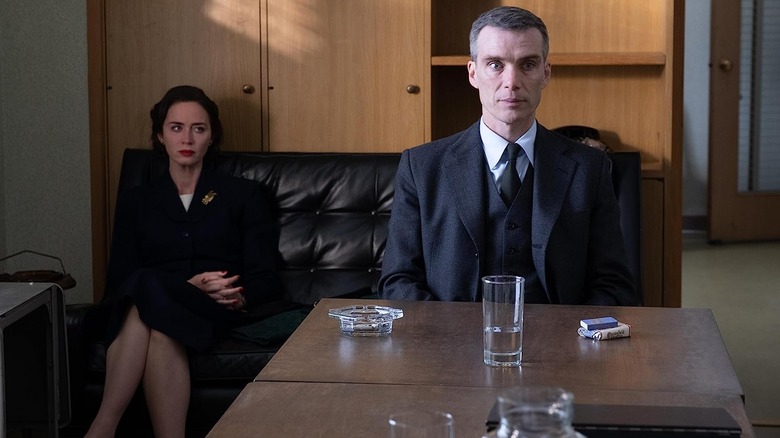Robert Pattinson Is Directly Responsible For Christopher Nolan Making Oppenheimer
Like a lot of people, I was fairly chilly on Christopher Nolan's "Tenet" at first. There was stuff I liked, for sure, but the whole thing was a little too Nolan-y for my tastes. Upon rewatching it, however, I found myself warming up to it. It's a vibes film about beautiful people in impeccably tailored outfits trotting around the world, but with an idiosyncratic touch that makes it less accessible than the James Bond and "Mission: Impossible" films. A lot of that is to do with the actual plot, which involves time inversion (a sci-fi notion best described as not not time travel) and a race to stop a doomsday weapon from destroying the world.
A doomsday weapon, albeit one that actually exists, is also at the heart of Nolan's latest film, "Oppenheimer." In fact, it was "Tenet" star Robert Pattinson who planted the idea of making a biopic about the so-called "Father of the Atomic Bomb" in Nolan's head to begin with. As Nolan recounted in an interview with The Hollywood Reporter, Pattinson had given him a series of Oppenheimer's real-life speeches as a wrap gift upon completing production on "Tenet," having recognized the parallels between Nolan's sci-fi thriller and the creation of the A-bomb. This, in turn, got the wheels spinning in Nolan's head, as he recognized the cinematic potential in a film that explores this crucial historical event from Oppenheimer's point of view. (Planting an idea in someone's head that leads to something much bigger? Hey, someone should make a film about that!)
The actual reality of the story
The thing that makes "Tenet" so re-watchable is that it's fiction. A story about nihilistic individuals trying to start a nuclear holocaust using a device called the "Algorithm" (a term that's only gotten more loaded since the film came out) would be extremely unsettling if it had any basis in reality. That's also why Nolan has described "Oppenheimer" as having an element of horror to it, seeing as it deals with a real doomsday weapon invented by real people, not a convoluted MacGuffin devised by over-the-top antagonists (à la Kenneth Branagh's scenery-devouring performance as the Russian oligarch villain in "Tenet"). As Nolan explained to THR:
"When you read the words of people speaking at that time, you see them wrestling with the implications and the consequences of what's happened and what they've done. I started to get very excited about, rather than using it as an analogy in a science fiction sense, telling the actual reality of the story, really trying to be there, to give people the experience of what it would have been like to be Oppenheimer in those moments."
Nolan's quest to better understand J. Robert Oppenheimer the man would lead to him using Kai Bird and Martin J. Sherwin's 2005 biography, "American Prometheus: The Triumph and Tragedy of J. Robert Oppenheimer," as the basis for his film, building off the speeches Pattinson gifted him. It's also why Nolan wrote his "Oppenheimer" script in the first person, so as to emphasize that we're seeing most of this story strictly through Oppenheimer's eyes, as opposed to a more objective perspective. His approach seems to have worked, too, with critics heralding Nolan's film as one of this year's best (you can read Chris Evangelista's review for /Film here). Good job, R-Patz!

